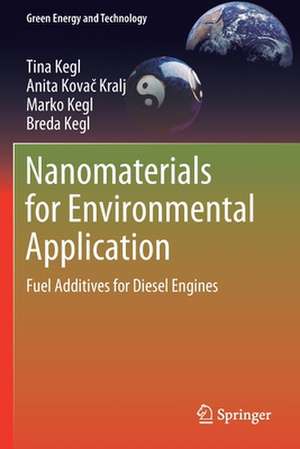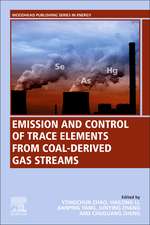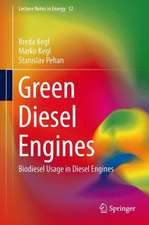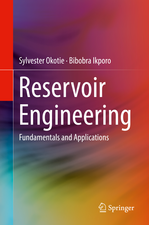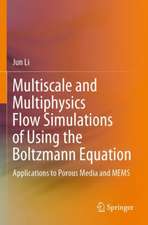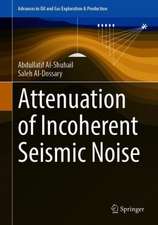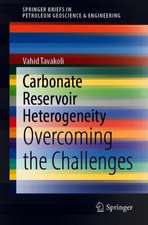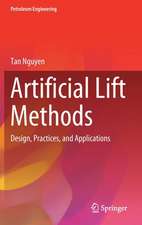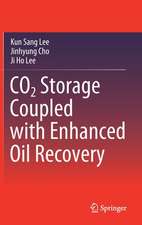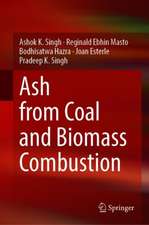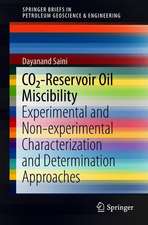Nanomaterials for Environmental Application: Fuel Additives for Diesel Engines: Green Energy and Technology
Autor Tina Kegl, Anita Kovač Kralj, Marko Kegl, Breda Keglen Limba Engleză Paperback – 19 aug 2021
Special attention is focused on questions related to the short-term use of nanomaterials in diesel engines, such as:
· What are the most important nanomaterial activities in diesel engines?
· What happens to nanomaterials at various stages, from the fuel tank to exhaust?
· What are the effects of nanofuel usage on diesel engine characteristics? and · What are the effects of nanomaterials on diesel engine parts and systems?
Given its scope, this book is a valuable resource for researchers and engineers in environmental science, mechanical engineering, and chemical engineering fields, as well as for advanced undergraduate and postgraduate students.
| Toate formatele și edițiile | Preț | Express |
|---|---|---|
| Paperback (1) | 721.81 lei 43-57 zile | |
| Springer International Publishing – 19 aug 2021 | 721.81 lei 43-57 zile | |
| Hardback (1) | 727.80 lei 43-57 zile | |
| Springer International Publishing – 19 aug 2020 | 727.80 lei 43-57 zile |
Din seria Green Energy and Technology
- 18%
 Preț: 943.43 lei
Preț: 943.43 lei - 20%
 Preț: 629.52 lei
Preț: 629.52 lei - 18%
 Preț: 1124.92 lei
Preț: 1124.92 lei - 18%
 Preț: 947.35 lei
Preț: 947.35 lei - 15%
 Preț: 655.92 lei
Preț: 655.92 lei - 18%
 Preț: 957.62 lei
Preț: 957.62 lei - 18%
 Preț: 789.52 lei
Preț: 789.52 lei - 17%
 Preț: 464.56 lei
Preț: 464.56 lei - 15%
 Preț: 645.79 lei
Preț: 645.79 lei - 18%
 Preț: 903.93 lei
Preț: 903.93 lei - 24%
 Preț: 1322.09 lei
Preț: 1322.09 lei - 18%
 Preț: 890.54 lei
Preț: 890.54 lei - 18%
 Preț: 1115.46 lei
Preț: 1115.46 lei - 18%
 Preț: 1117.03 lei
Preț: 1117.03 lei - 18%
 Preț: 949.73 lei
Preț: 949.73 lei - 18%
 Preț: 892.11 lei
Preț: 892.11 lei - 15%
 Preț: 648.24 lei
Preț: 648.24 lei - 18%
 Preț: 997.09 lei
Preț: 997.09 lei - 15%
 Preț: 579.81 lei
Preț: 579.81 lei - 18%
 Preț: 1123.15 lei
Preț: 1123.15 lei - 18%
 Preț: 961.41 lei
Preț: 961.41 lei - 17%
 Preț: 490.23 lei
Preț: 490.23 lei - 18%
 Preț: 904.60 lei
Preț: 904.60 lei - 15%
 Preț: 643.34 lei
Preț: 643.34 lei -
 Preț: 287.91 lei
Preț: 287.91 lei - 24%
 Preț: 634.05 lei
Preț: 634.05 lei -
 Preț: 379.40 lei
Preț: 379.40 lei - 18%
 Preț: 783.20 lei
Preț: 783.20 lei - 18%
 Preț: 1394.84 lei
Preț: 1394.84 lei - 18%
 Preț: 1691.57 lei
Preț: 1691.57 lei - 18%
 Preț: 1112.48 lei
Preț: 1112.48 lei - 15%
 Preț: 592.61 lei
Preț: 592.61 lei - 18%
 Preț: 952.09 lei
Preț: 952.09 lei - 18%
 Preț: 944.19 lei
Preț: 944.19 lei - 18%
 Preț: 891.33 lei
Preț: 891.33 lei - 18%
 Preț: 1252.44 lei
Preț: 1252.44 lei - 18%
 Preț: 789.52 lei
Preț: 789.52 lei - 20%
 Preț: 566.30 lei
Preț: 566.30 lei - 18%
 Preț: 1113.71 lei
Preț: 1113.71 lei - 18%
 Preț: 1114.24 lei
Preț: 1114.24 lei - 24%
 Preț: 590.60 lei
Preț: 590.60 lei - 20%
 Preț: 567.50 lei
Preț: 567.50 lei - 24%
 Preț: 907.50 lei
Preț: 907.50 lei - 18%
 Preț: 952.89 lei
Preț: 952.89 lei - 18%
 Preț: 952.89 lei
Preț: 952.89 lei - 18%
 Preț: 950.52 lei
Preț: 950.52 lei
Preț: 721.81 lei
Preț vechi: 880.26 lei
-18% Nou
Puncte Express: 1083
Preț estimativ în valută:
138.16€ • 150.13$ • 116.13£
138.16€ • 150.13$ • 116.13£
Carte tipărită la comandă
Livrare economică 21 aprilie-05 mai
Preluare comenzi: 021 569.72.76
Specificații
ISBN-13: 9783030547103
ISBN-10: 3030547108
Ilustrații: IX, 180 p. 44 illus. in color.
Dimensiuni: 155 x 235 mm
Greutate: 0.28 kg
Ediția:1st ed. 2020
Editura: Springer International Publishing
Colecția Springer
Seria Green Energy and Technology
Locul publicării:Cham, Switzerland
ISBN-10: 3030547108
Ilustrații: IX, 180 p. 44 illus. in color.
Dimensiuni: 155 x 235 mm
Greutate: 0.28 kg
Ediția:1st ed. 2020
Editura: Springer International Publishing
Colecția Springer
Seria Green Energy and Technology
Locul publicării:Cham, Switzerland
Cuprins
Introduction.- Diesel Engine.- Nanomaterials for Diesel Engine Applications.- Nanofuels.- Nanofuels Usage in Diesel Engines.- Practical Viability of Nanofuels Usage in Diesel Engines.- Conclusions and Future Perspectives.
Notă biografică
Tina Kegl completed her M.Sc. degree at the University of Maribor, Faculty of Chemistry and Chemical Engineering, where she is now studying for her Ph.D. For her diploma and research works, she has received prestigious awards from international companies such as Krka and Henkel, the Dean’s Prize, the Perlach Prize from the University of Maribor, and a Zois scholarship from the Republic of Slovenia. Her research work chiefly involves nanotechnology, waste treatment, process system engineering, and sustainable development.
Assistant Professor Anita Kovač-Kralj completed her Ph.D. degree at the University of Maribor, Faculty of Chemistry and Chemical Engineering. She has been working as an Assistant Professor of Chemistry and Chemical Technology since 2002 and has been a recipient of many award and grants. Her international experience includes a range of different countries and fields of study. Her research interests are reflected in her wide range of publications in national and international journals.
Professor Marko Kegl completed his Ph.D. degree at the University of Maribor, Faculty of Mechanical Engineering. He teaches and conducts research in the areas of mechanics and computational engineering. His research focuses on the optimization of mechanical systems, especially time-dependent mechanical systems, and on sizing, shape, and topology optimization for statically loaded structures. During his postdoctoral research, he spent one year at the Technical University of Braunschweig, Germany as a Fellow of the Alexander von Humboldt Foundation.
Professor Breda Kegl completed her Ph.D. degree at the University of Maribor, Faculty of Mechanical Engineering. She teaches and conducts research in the area of internal combustion engines. Her research focuses on diesel engines, especially on alternative fuels, engine performance and emissions, and engine optimization. In addition to having engaged in various international industrial projects, for many years she was one of the mentors of the Formula Student team at the Faculty of Mechanical Engineering in Maribor.
Assistant Professor Anita Kovač-Kralj completed her Ph.D. degree at the University of Maribor, Faculty of Chemistry and Chemical Engineering. She has been working as an Assistant Professor of Chemistry and Chemical Technology since 2002 and has been a recipient of many award and grants. Her international experience includes a range of different countries and fields of study. Her research interests are reflected in her wide range of publications in national and international journals.
Professor Marko Kegl completed his Ph.D. degree at the University of Maribor, Faculty of Mechanical Engineering. He teaches and conducts research in the areas of mechanics and computational engineering. His research focuses on the optimization of mechanical systems, especially time-dependent mechanical systems, and on sizing, shape, and topology optimization for statically loaded structures. During his postdoctoral research, he spent one year at the Technical University of Braunschweig, Germany as a Fellow of the Alexander von Humboldt Foundation.
Professor Breda Kegl completed her Ph.D. degree at the University of Maribor, Faculty of Mechanical Engineering. She teaches and conducts research in the area of internal combustion engines. Her research focuses on diesel engines, especially on alternative fuels, engine performance and emissions, and engine optimization. In addition to having engaged in various international industrial projects, for many years she was one of the mentors of the Formula Student team at the Faculty of Mechanical Engineering in Maribor.
Textul de pe ultima copertă
This book explores the use of nanomaterials as diesel fuel additives. It extensively reviews the diesel engine characteristics and the most frequently used nanomaterials and nanofuels and discusses the practical issues regarding the viability of nanomaterials as fuel additives from technical, environmental, and human health viewpoints.
Special attention is focused on questions related to the short-term use of nanomaterials in diesel engines, such as:
· What are the most important nanomaterial activities in diesel engines?
· What happens to nanomaterials at various stages, from the fuel tank to exhaust?
· What are the effects of nanofuel usage on diesel engine characteristics? and · What are the effects of nanomaterials on diesel engine parts and systems?
Given its scope, this book is a valuable resource for researchers and engineers in environmental science, mechanical engineering, and chemical engineering fields, as well as for advanced undergraduate and postgraduate students.
Special attention is focused on questions related to the short-term use of nanomaterials in diesel engines, such as:
· What are the most important nanomaterial activities in diesel engines?
· What happens to nanomaterials at various stages, from the fuel tank to exhaust?
· What are the effects of nanofuel usage on diesel engine characteristics? and · What are the effects of nanomaterials on diesel engine parts and systems?
Given its scope, this book is a valuable resource for researchers and engineers in environmental science, mechanical engineering, and chemical engineering fields, as well as for advanced undergraduate and postgraduate students.
Caracteristici
Provides a comprehensive review of the benefits and impacts of the use of nanomaterials as diesel fuel additives Explains synthesis methods and characterization techniques for nanofuels Features numerous illustrations and tables to help readers understand the methodologies
